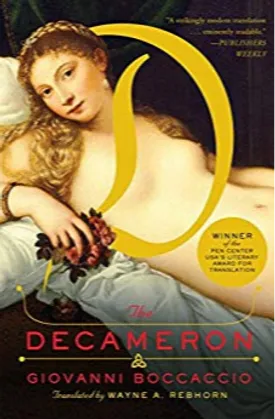Giovanni Boccaccio
Giovanni Boccaccio was an Italian author and poet who lived during the Middle Ages, in the 14th century. He is best known for his masterpiece, the Decameron, which is comprised of 100 stories told by a group of ten young men and women escaping from the Plague of 1348 in Florence.
Giovanni Boccaccio was born in 1313 in Certaldo, one of a number of Tuscan towns that would eventually become part of the Republic of Florence. His father, Boccaccio, was a successful high-ranking banker who worked in Florence, and his mother’s name was Brigida. Boccaccio had two half-siblings through his father’s remarriage, and his family was influential in Tuscan society.
Despite belonging to a wealthy banking family, Boccaccio was raised solely by his mother, Brigida, and even spent much of his youth with her relatives. This upbringing had a strong influence on his writing, though Boccaccio went on to attend the University of Naples, where he studied both classical Latin and Greek. He is known to have read and studied extensively, especially works by ancient Greek and Roman authors such as Horace and Plato.
As a writer, Boccaccio is credited with laying the foundations for the Italian renaissance. He is considered to exhibit a unique blend of realism, comedy and tragedy in his works, and he often seemed to challenge the conventions of society and religion with his creative ideas. He declined the opportunity to go into the banking industry, instead choosing to focus exclusively on writing and teaching.
Boccaccio produced literature in multiple genres, from lyric poetry to works of fiction. His most famous work, The Decameron, is a collection of stories which Boccaccio claims to have heard and related to his audience. It consists of 100 stories told by seven young women and three young men who have fled the city to escape the treacherous plague. The characters tell stories of love, lust, faith and follies in a light-hearted and bawdy manner, and the work has been admired and studied for centuries.
Other works include The Corbaccio, which is a collection of various invectives and outbursts, thought to have been written by Boccaccio in response to an unrequited love, and the Fiammetta, a book thought to be written from the perspective of a woman.
In addition to literature, Boccaccio is also known for his contributions to art and culture. He was a colleague of the illustrious Italian poet Dante Alighieri, and he was heavily involved in the movement for Italian vernacular literature.
Giovanni Boccaccio died on December 21, 1375 and he was buried in the hermitage of Fiesole. His works are still celebrated to this day, and he is considered to be one of the most influential people in the field of Italian literary history.

